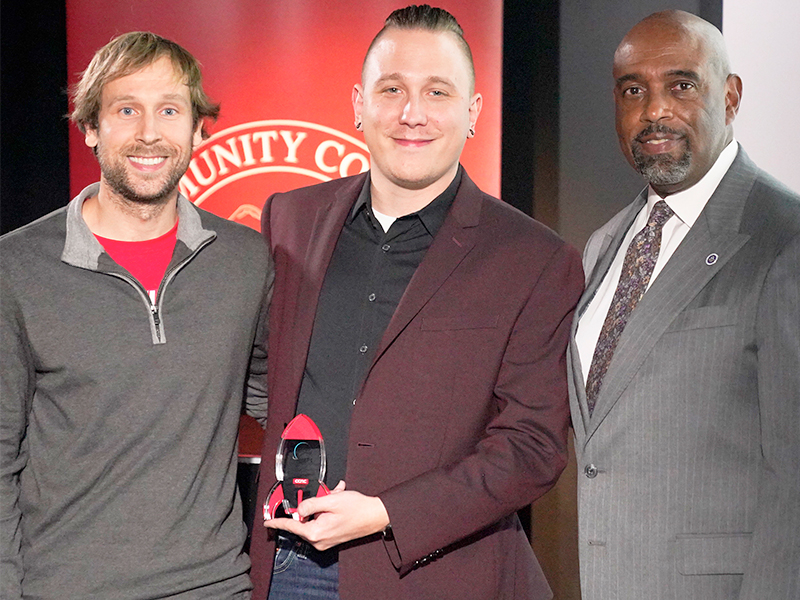CCAC Students Set to Launch Cancer Experiment into Space

CCAC students Daniel Roth and Jason Gomes posed with Dr. Quintin Bullock following the presentation of their winning project at the Moonshot Museum in Nov. 2022.
Pittsburgh
A research experiment created by students from the Community College of Allegheny County (CCAC) has been selected by a national panel of experts to be sent to the International Space Station in early June. A team of astronauts will conduct the experiment in space, and it will be sent back to Earth for harvesting and analysis.
Sponsored by the National Center for Earth and Space Science Education (NCESSE) and the Arthur C. Clark Institute for Space Education, the Student Spaceflight Experiments Program (SSEP) invites students from selected colleges, universities and organizations across the U.S. to develop research experiments to promote space education. CCAC was one of only three colleges in the nation chosen to participate in the 2022 national competition.
"We are proud of our SSEP students, and we were honored to be chosen to participate in this prestigious program. There is a profound impact to supporting and fostering students at two-year colleges in earth and space science disciplines. Because community colleges attract a large proportion of students from underrepresented groups, we can not only create pathways for more students to enter the workforce or transfer to four-year schools, we can be a great resource to introduce students to new and emerging career opportunities, as well as help build diversity in the earth and space science professional workforces," said Dr. Quintin Bullock, CCAC president.
Teams of CCAC students from various academic disciplines competed in fall 2022 to design and present unique microgravity experiments, one of which would be selected to be sent to the International Space Station. In late November 2022, a national review board assembled by the NCESSE selected the winning CCAC project, which will be loaded onto a SpaceX rocket in June to travel into space. The students will present the results of their experiment at the SSEP National Conference in summer 2023.
"There is no better way to learn how science works than to participate in it. Our students rose to the challenge, and I'm continually impressed at the results."
Jason Gomes, a student in CCAC's Biotechnology program, and Daniel Roth, a student in CCAC's Respiratory Therapy program, submitted their winning experiment titled "Microgravity's Effects on the Activation of Dormant Metastatic Cancers." The experiment examines the effects of exposure to microgravity on cycles of cancer cell proliferation and/or dormancy, and will help determine if space travel accelerates cancer formation in astronauts. Moreover, if the experiment reveals that microgravity has a significant impact on the dormancy/proliferation cycle, this would indicate that physical cues in a cell's environment could be much more important than previously suspected in the activation of cancer cells and should therefore be prioritized in future cancer research.
"I know that if I were going to fly into space, I would love to know whether or not this kind of trip could increase my chances of developing cancer," said Justin Starr, PhD, CCAC endowed professor of advanced technologies and coordinator for the college's participation in the competition. "CCAC brings so many different students together. The collaboration between students studying biology and respiratory therapy was key to such an innovative experimental design."
The students' mentor, CCAC Biology Professor Francis Cartieri, appreciated the hands-on nature of the program. "There is no better way to learn how science works than to participate in it. Our students rose to the challenge, and I'm continually impressed at the results."
Daniel Roth noted that for his team, the process is far from complete. "Even though it was exciting to be selected, our team realizes that the real work is yet to come. Now we get to conduct the experiment we spent so many months researching. It is not every day that you get a chance to conduct an experiment on the International Space Station."
There are a total of 37 communities in the United States, Canada and Ukraine (K-12 and college-level) participating in the 2022 SSEP program.
About SSEP
The Student Spaceflight Experiments Program is a program of the National Center for Earth and Space Science Education (NCESSE) in the U.S. and the Arthur C. Clarke Institute for Space Education Internationally. It is enabled through a strategic partnership with Nanoracks, LLC, which is working with NASA under a Space Act Agreement as part of the utilization of the International Space Station as a National Laboratory.
